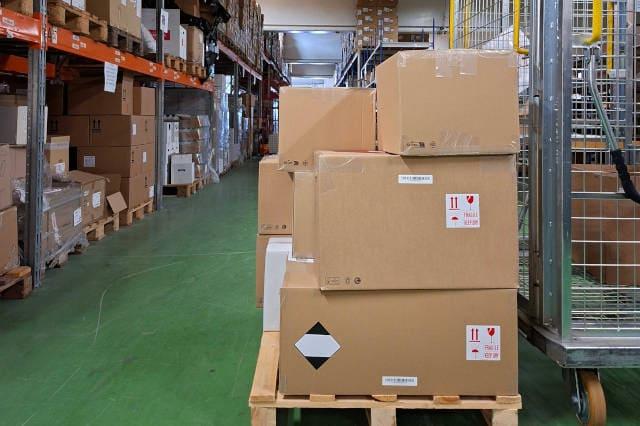Selling products in Switzerland requires customs clearance, as Switzerland is not part of the European Union. Rest assured, since January 1, 2024, Switzerland has eliminated customs duties on industrial products (clothing, electronics, accessories, etc.). However, a customs declaration remains mandatory. You should also check whether VAT (Value Added Tax) is payable. Only small shipments with a VAT of less than 5 Swiss francs (approximately €5.33) are exempt. This represents an item worth €63 or €67.22 (at a rate of 8.1%). However, if your turnover is more than €100,000 or €106,700€ in Switzerland and abroad, you must register and pay the VAT amount, regardless of the amount.
Additionally, if you're importing over €1,000 from the EU, you must file an export declaration with your country's customs. With this proof, the product is considered exported, meaning no French (or other) VAT is payable.
DAP or DDP: Improving the Customer Experience
If you want to maintain a loyal relationship with your customers, be careful not to hide hidden fees. Customers quickly feel betrayed (by their merchant) when they have to pay additional fees when clearing customs. Two scenarios are possible: DAP (Delivered At Place) or DDU (Duties Unpaid) and DDP (Delivery Duty Paid). As a reminder, there are grouped and individual customs clearance options.
DAP: The customer is notified that the product is waiting at customs. They must pay the VAT and any fees charged by the carrier. The waiting time is extended, and if the fees are too high, they may cancel their purchase. If a package costs less than €60 or €64, you can afford to send it DAP, as there will be no VAT or fees for the customer.
DDP: The e-merchant takes care of everything: import VAT and miscellaneous fees. This provides the best possible customer experience. They pay what is visible on your website at checkout, with greater transparency.

Swiss VAT for ecommerce
There are three VAT rates applicable in Switzerland: the standard rate, the reduced rate, and the special rate for accommodation (which does not apply to us). As a reminder, if the VAT rate collected (tax amount) is less than €5 or €5.33, and if your turnover is less than €100,000 or approximately €106,699.10 in Switzerland, you do not pay it.
The standard rate: 8.1% VAT for an item of 63.- or €67.22 represents the minimum rate for VAT to be applicable. The standard rate covers all services not subject to the special rate.
The reduced rate: 2.6% VAT for an item of 194.- or €207 represents the minimum value for VAT to be applied. The reduced rate includes: foodstuffs, medicines and dietary supplements, newspapers/books, cereals, plants, livestock/poultry, fish, etc.
The special rate for accommodation: applies to accommodation with breakfast (even if billed separately).
What should you do if your turnover exceeds CHF 100,000 or approximately €106,700 in Switzerland and abroad?
If your turnover exceeds CHF 100,000 or €106,700 over a year in Switzerland and abroad, you are subject to VAT. Please note that if only small shipments (less than CHF 5 in VAT) are affected, the CHF 100,000 or €106,700 threshold is calculated only on these small shipments destined for Switzerland.
If the threshold is exceeded, your deliveries are considered domestic and you must register in Switzerland. You become taxable in Switzerland and will pay VAT at 8.1%, or 2.6% if all your items are specialty products. Your e-commerce website sales prices must include VAT when they are intended for the Swiss market. Note that when you import goods into Switzerland via DDP delivery, you pay VAT, but you can deduct it as input tax. This avoids double taxation between the VAT invoiced to the customer and the VAT on the import.
It should be noted that since 2025, marketplaces must collect VAT on the sale of goods to Switzerland if the platform exceeds CHF 100,000. This is to ensure tax equality between Swiss and foreign sellers.

Carry out compliant customs clearance in Switzerland
If you must be taxable in Switzerland and regularly import goods, having a customs account is the simplest solution. However, you can also obtain the necessary customs clearance documents.
If shipping via DAP, a CN22 or CN23 document is affixed to the shipment (in the form of a label). The document allows you to identify the contents and clear them through customs accordingly.
If your shipment is DDP, you must first clear the export and import customs upon entry into Switzerland. This can be done by CSV file transfer or API. However, it is preferable to notify the relevant service providers of your shipments by email in advance and provide all the necessary information. Find detailed information from Swiss Post.
How to obtain fiscal representation in Switzerland?
The tax representative assists you with several administrative procedures with the Swiss Confederation, such as VAT registration. Once you have obtained your VAT number in the form CHE-XXX.XXX.XXX, the administration will register you in a centralized database. To do this, you will be asked for a deposit of 3% of your annual taxable turnover in Switzerland. This amount is CHF 2,000, but will never exceed CHF 250,000. VAT must be paid quarterly, and only the turnover declared in Switzerland is required.
If your company regularly exports to Switzerland, you may be required to set up a customs account. Many benefits can be expected, such as reduced processing times, cashless payment, and electronic invoicing.
Emaloja offers tax representation, commercial domiciliation and other procedures related to the import of goods into Switzerland, including warehousing.
Ecommerce and Swiss customs: be ready to import your goods into Switzerland!